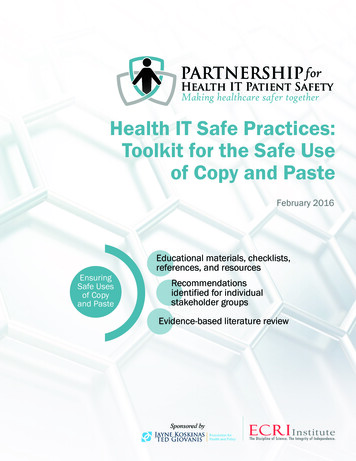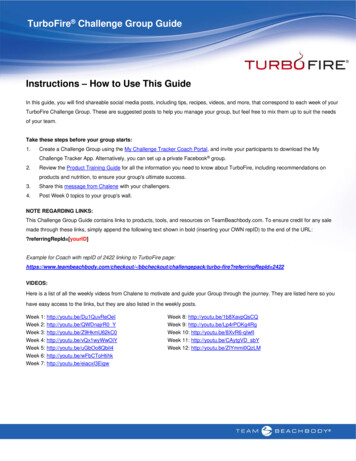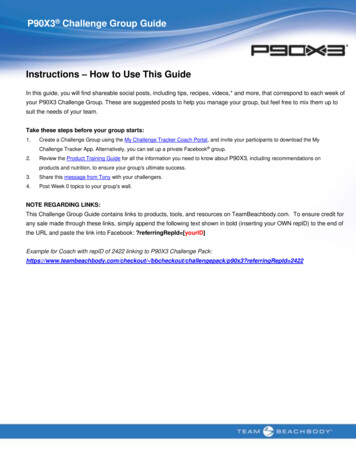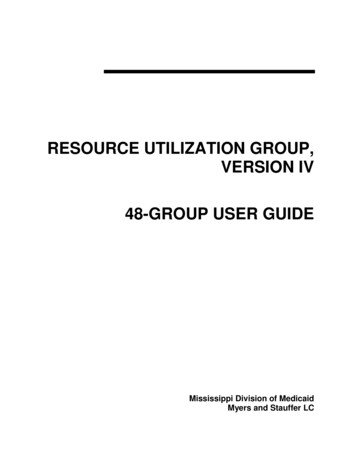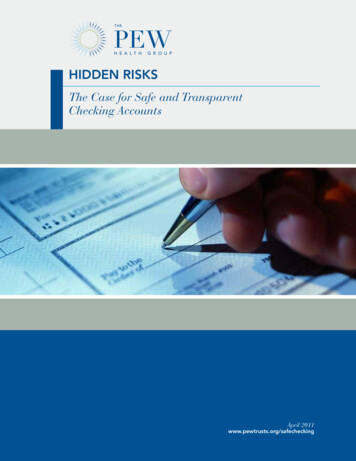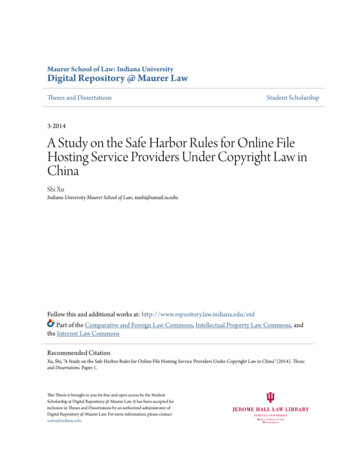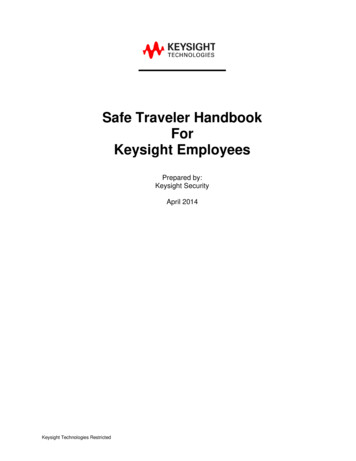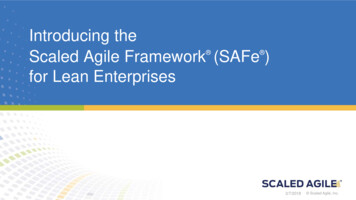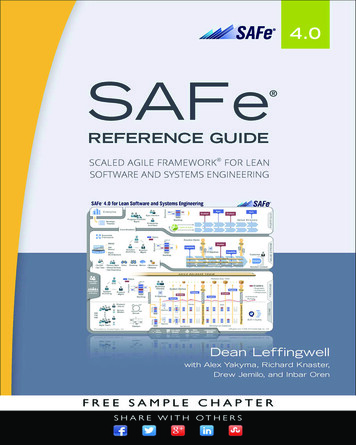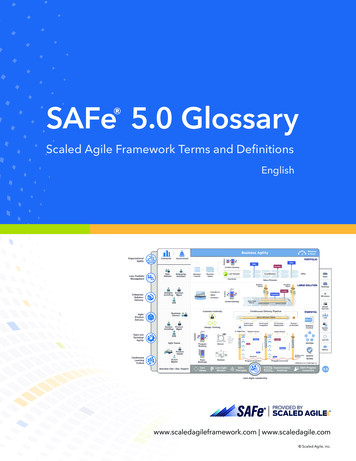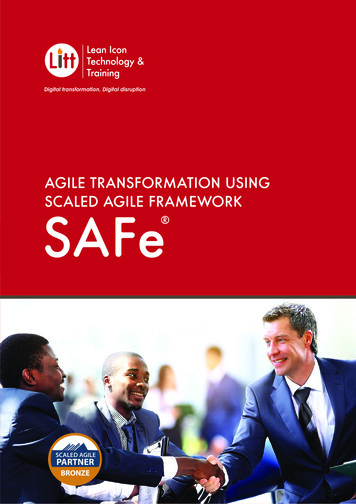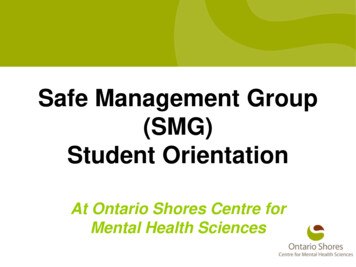
Transcription
Safe Management Group(SMG)Student OrientationAt Ontario Shores Centre forMental Health Sciences
Safe Management Group Safe Management Group (SMG)Training Program offers generic skills &techniques to support clinical staff in theprevention & management of the crisiscontinuum
SMG versus OtherPrograms SMG, has a psychologically-basedphilosophy with a prevention focus. Itwas developed by psychologists andbehavioural therapists and looks at thefunctions of behaviour. This aligns withrecovery and our mental healthapproach to prevent and care for patientwho are experiencing crisis.
Role of Advanced Trainers Co-facilitates SMG Training for OntarioShores Peer support for staff practice of SMGrelationship management, de-escalationskills and safe physical techniques Works as a member of the team at CodeWhites to support the team in promotingstaff and client safety
TherapeuticRelationshipModel
Therapeutic Relationship Model The model was created to focus on emphasizing workingtogether in collaboration with patients which willpositively impact staff and patient safety Evidence supports the development of multidimensionalmodels for the management of aggression in mentalhealth care settings (Duxbury, 2005)
Therapeutic RelationshipModel Promote wellbeing and strengths Positive patient outcomes Promote least restraints and least intrusivephilosophy
Collaborative Recovery Model Guiding Principle 1Recovery as an individual process Guiding Principle 2 Collaboration and Autonomy Support
Components of the TherapeuticRelationship Model 1 Change Enhancement 2 Collaborative Strengths and ValuesIdentification 3 Collaborative Visioning and GoalStriving 4 Collaborative Action and Monitoring
What is the SMG Program Crisis Intervention Training Designed by Psychologists, BehaviourConsultants & Physical InterventionSpecialists Approved for use with children & adultsby Ministry of Community & SocialServices in 2003
Ontario Shores’ adopted SMG in 2008to ensure staff are trained in aCERTIFIED program to support bestpractice
Approach Prevention of aggressive incidents Least intrusive Effective use of safe techniques
Risk Management
Summary of RiskManagement What is a Behavioural crisis Two types of behavioural crisis: Predictablevs. Unpredictable Effective Prevention of behaviour crises: Plan for the predictable Know the response to the unpredictable
Risk ManagementRisk management includes: System Preparatione.g. Policies and Procedures Preventative Planninge.g. Plan of Care Functions of behaviouri.e. What the patient needs or wants
Summary of RiskManagement Environmental preparation– Enviroscan Staff preparation– Aware of our own internal processes– Stress management
Positive Self-ManagementPositive ThoughtsPositive OutcomesPositive FeelingsPositive Behaviour
Relationship Management
Summary of RelationshipManagement Power & equity– Technique: Provide greater choices inareas of insufficient self-determination Social Exchange & Reciprocity– Technique: Create balance; plan morepositive experiences & reduceunnecessary negative experiences
Summary of RelationshipManagement Empathy, Caring, Acceptance– Technique: Active listening, attention toverbal & non-verbal cues, inclusion ofpatient Genuineness & Openness– Technique: Disclose appropriate feelings,personal thoughts & information
Summary of RelationshipManagement Responding to Emotions– Technique: Allow patient to expressemotions instead of interrupting patientduring this process; use active listeningskills. “Meet the patient where the patient isat present”
Summary of RelationshipManagement Coercion– Technique:– Avoid giving in to coercion; redirect by active listening& problem solving– Avoid presenting coercive behaviours; Provide choicesand or make a plan ahead of time – empower theservice user. Interpersonal Boundaries– Techniques: Discuss with other staff; Negotiate &compromise with others on less important rules; Writedown limits & frequently review & communicate withothers
Managing Aggression
Summary of ManagingAggression Aggression usually does nothappen suddenly & without warning Aggression often occurs over time& through different phases There are NO set number of stagesa patient will go through
Code White Response:Team Approach
Revised Code White Policy Code White responders will practice a leastrestraint & least intrusive philosophy & ensurealternative to restraints have been exhaustedfirst & whenever possible There will be an identified Code White TeamLeader at every Code White team responsewho will assign roles & responsibilities
Revised Code White Policy Code White team leader responsible toensure a Safety Occurrence Report &Code White Review will be completedfollowing the event Emotional debriefing is available forstaff through Critical Incident StressSupport Team (CISS) & EmployeeAssistance Program (EAP)
Safe Management Group Safe Management Group (SMG) Training Program offers generic skills & techniques to support clinical staff in the prevention & management of the crisis continuum . SMG versus Other Programs SMG, has a psychologically-based philosophy with
